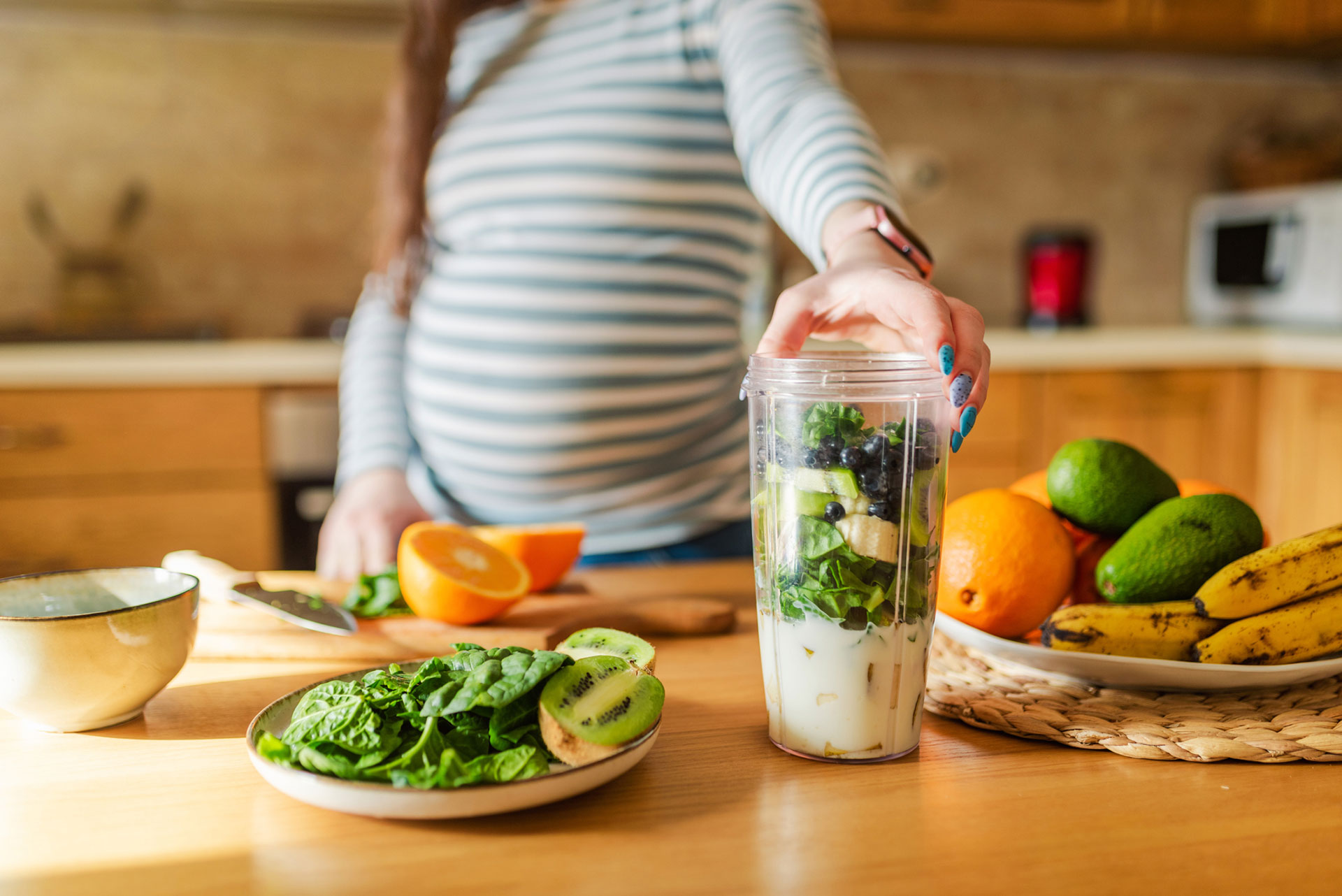“Sage Porcini and Cauliflower Soup” | myMindBodyBaby
It’s midweek and my husband, daughter, dog and I have gone north for a few extra days to get away and enjoy a few hikes and warm fires. So as I settle into my comfy chair, staring outside at freshly fallen snow and slightly chilled from a blustery family walk, I can’t help but be thankful for happening upon this tasty soup recipe.
I wait with anticipation each season for the LCBO’s Food and Drink magazine to make its grand entrance, and this winter they featured a mushroom soup. Now, of course, I had to fiddle with it bit, to “nutrition-ize” it, but overall it’s the perfect addition to a snowy weekend and to any immune system. But what makes it so good?
It’s full of fun-guys! Fungus. Aka mushrooms
- Rich in selenium- a powerful antioxidant that helps rid the body of free radicals. In fact, some studies, selenium has also used with success to treat male infertility by helping increase sperm count, motility, viability, sperm volume and morphology.
- Immune boosting. Mushrooms increase the production of antiviral proteins that are released while they are trying to protect the body. In other words, they are immune boosting little gems of goodness so eat them whenever and wherever you can!
- B’s for days. Mushrooms are loaded with essential B vitamins that not only help keep you feeling energized, but also help support the adrenal glands. These glands produce cortisol, a stress hormone that not only suppresses the immune system (hello!) but also when overworked, throws off a delicate balance of other hormone ratios in the body. Enter DHEA.
What is DHEA and Why You Should Care?
DHEA (Dehydroepiandrosterone) is a hormone produced by the adrenals and precursors other hormones such as estrogen and testosterone. Females convert DHEA into androgens (male hormones) that are essential in the female body for the production and development of healthy eggs.
Imbalanced DHEA, Cortisol Levels and Fertility
An imbalance of these two hormones can lead to some of the following conditions:
- PCOS (polycystic ovarian syndrome)
- Lowered estrogen
- irregular menstrual cycle
- altered ovulation
- Elevated insulin levels
- Altered or inhibited thyroid function that can result ovulatory challenges
A well functioning network of hormones is essential for overall homeostasis but absolutely critical for conception, pregnancy and postpartum health. So lets take a look at 3 causes of hormone imbalance that can be addressed with lifestyle changes.
3 Causes of Hormone Imbalance
Before we get into how to balance hormones with food, it’s good to understand some of the key factors that create imbalance in the first place.
1. Stress. Chronic stress can cause the body to use progesterone (leading to lowered progesterone) to make cortisol, (stress hormone), which we learned above can impact and could lead to imbalance of a host of hormones.
2. Body Fat. Excess carbohydrates aka sugars are stored as fat in the body. One result of extra fat is increased estrogen (estrogen dominance). Too much estrogen can lead to fatigue, menstrual irregularities, headaches, low sex drive, uterine fibroids and more.
3. Toxins: These can come from personal care products, cleaning products, BPA and other plastics in the form of hormone disrupting chemicals. These are called xenoestrogens (hormone disruptors), they mimic and interfere with natural estrogen in the body. In fact, this combined with some people’s inability to properly detoxify can lead to further hormonal imbalances.
Top 5 Hormone Balancing Foods
1. Fish. Protein sources like fish, organic poultry, eggs, organic Greek yogurt, hemp seeds hormone-disrupting and clean, vegan protein powders are vital macronutrients for balancing blood sugars, building muscle mass (helps to modify hormone levels), and building and repairing tissues. In addition, protein helps to increase the metabolism and as a result, helps to reduce body fat (which we learned above can lead to estrogen dominance).
2. Avocado. Eating healthy fats (heavy up on the plant based ones!) are essential for regulating blood sugars which can help help to reduce insulin levels. In addition, healthy fats also help to produce certain hormones that help to control hunger and cravings. Important fats to include in your diet: extra virgin olive oil, nuts (almonds, walnuts, pecans, pistachio and more), seeds (chia, flax, hemp, pumpkin, sesame and sunflower) and unsweetened coconut.
3. Sauerkraut. Fermented foods like kimchi, sauerkraut, kombucha and kefir help to populate the gastrointestinal system with beneficial bacteria. These help support the immune system, facilitate digestion and the help the production of hormones!
4. Fiber. Not only does fibre help keep our pipes working properly, which as we learned above is key for optimal hormone production, but fiber also helps balance blood sugars which is imperative for healthy cortisol, insulin and estrogen balance.
Aim for 25-30g of fiber per day made up of food s like veggies, bean and lentils, black and raspberries, plus sweet potato and quinoa.
5. Herbs and Spices. Foods like turmeric, cinnamon, clove, ginger, cilantro and many others are packed full of anti-inflammatory, antioxidant health promoting, hormone balancing benefits.
A few of my favourite ways to use herbs and spices
- cinnamon and clove on oatmeal
- Turmeric into a smoothie
- Oregano and basil into soups and sauces
- Ginger into hot water as tea
- Dill and parsley on salads
- Sage into soups
Finally! After all that I’m sure you can’t WAIT for this benefit-packed soup. The wait is over – here you go! Sage Porcini and Cauliflower Soup! It’s loaded with immune fighting and hormone balancing foods and not to mention packed with flavour. Feel free to play around and add anything else you would like and don’t forget to tag us in a picture of your delicious creation! #myMMBB
Sage and Porcini Cauliflower Soup

- 1 oz or 30 g dried porcini mushrooms (feel free to double this if you would like)
- 2 cups boiling water
- 2 tbsp butter divided
- 1 small head cauliflower (chopped into small pieces)
- 2 medium onions- sliced
- sea salt
- 3 cloves of garlic (chopped)
- 2 tbsp chopped rosemary
- ¼ cup loosely packed chopped fresh sage
- 1 bay leaf
- 4 cups vegetable or chicken broth
- 1 cup water
- 4 cups chopped kale
- 2 tbsp gluten free Worcestershire sauce
- combine boiling water and dried mushrooms in a heat-proof bowel and set aside
- Melt ½ the butter in a large pot over medium-high heat; add cauliflower and cook until golden, stirring from time to time, about 8 minutes.
- Add remaining butter, onions, season with salt and cook for 10 -15 minutes until some colour starts to appear.
- Meanwhile add water and mushrooms (plus water) to the pot of onions and cauliflower. Add in garlic, rosemary, sage, bay leaf, broth and bring to a boil. Add in kale and Worcestershire sauce a cook for another 15 min on a low simmer.
Inspired from Food and Drink Magazine
Photo credit: LCBO Food & Drink Magazine




